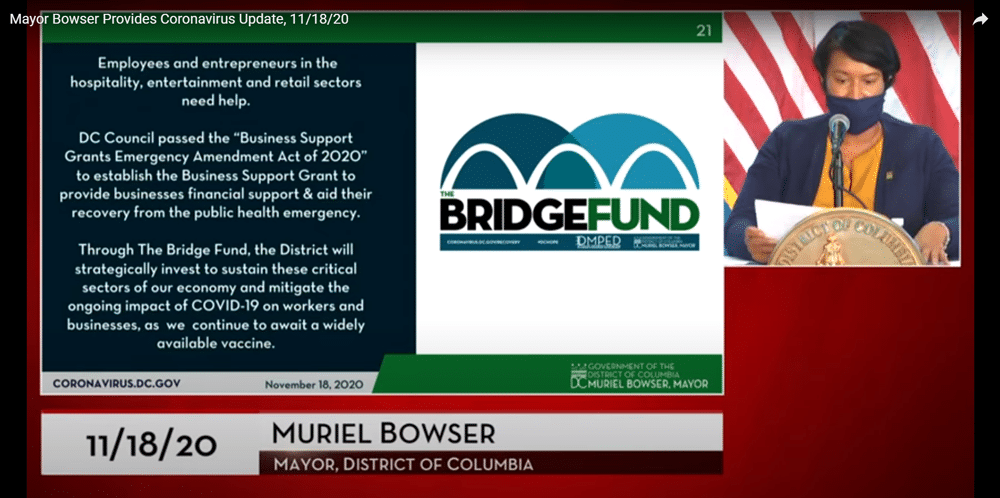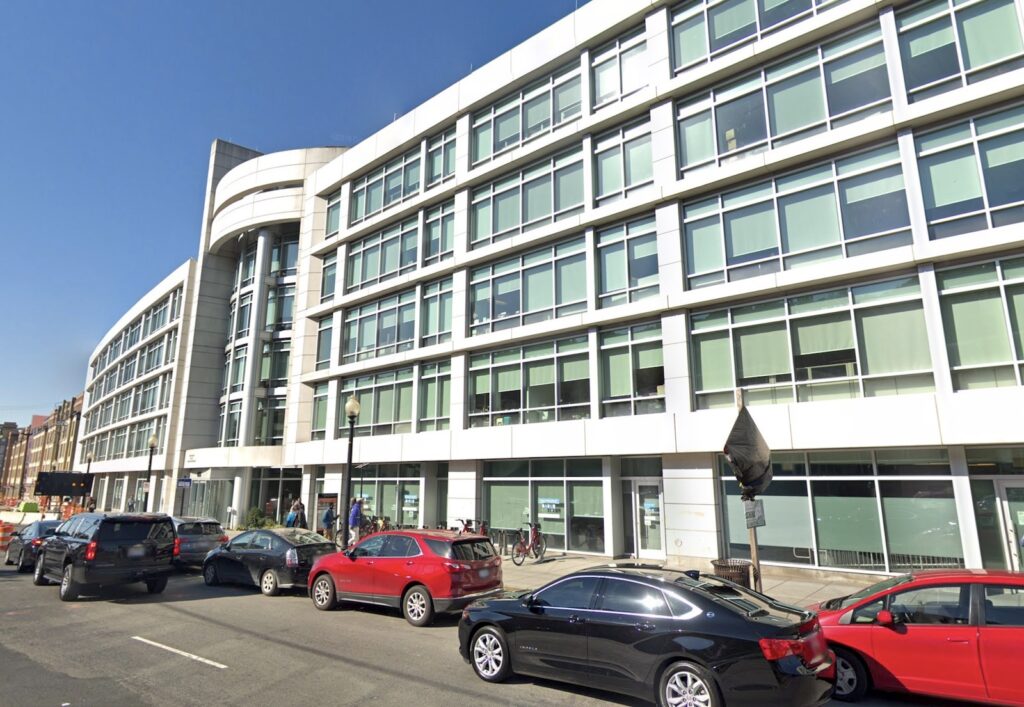The response to Mayor Muriel Bowser’s latest COVID-19 economic relief program has been mixed, as anti-poverty advocates question whether the money is going to the right places.
The Bridge Fund, announced on Nov. 18, is a $100 million pot of money designed to help businesses struggling with economic impacts from COVID-19. Divided between the restaurant, retail, entertainment, and hotel industries, some of the sectors hardest hit by the virus, the grants will cover expenses and payroll. However, as a coalition of advocates expressed in a letter sent to the mayor on Dec. 9, some worry the fund places too much focus on businesses and misses an opportunity to help residents in the District who are struggling, including those experiencing homelessness.
To Jesse Rabinowitz, who works in his role as advocacy and campaign manager at Miriam’s Kitchen to suggest ways District money could help those experiencing homelessness, the program is just the government’s latest prioritization of businesses over residents in need.
“The fact that D.C. was able to find $80 million to support businesses while cutting funding to homeless service agencies just didn’t add up,” Rabinowitz, said, referencing recent reports that D.C. is pulling back funding to at least six homeless services organizations. The cuts could total tens of thousands of dollars per organization, meaning cuts to shelter, transitional housing, and services such as counseling. These cuts follow a $12.6 million budget cut for homeless services in fiscal year 2021, after the Council voted down two amendments that would have allocated more funding to these services. It is not clear whether these most recent cuts are part of that budget cut, or a separate measure.
2/ Today, alongside @CouncilOfDC, we announced The Bridge Fund, a $100m investment to support workers and help local businesses get to the other side of this.
Learn more: https://t.co/tEiN7xZuC4 pic.twitter.com/gX30BFdNjx— Mayor Muriel Bowser (@MayorBowser) November 19, 2020
The bulk of the money for the fund, $80 million, is drawn from D.C.’s reserves. At the start of the year, there was $1.4 billion in these “rainy day” accounts. The rest of the new Bridge Fund is supplemented by $20 million of federal dollars provided through the CARES Act.
There are four separate reserve accounts, all governed by fairly strict requirements for their use, including repaying funds withdrawn within 1-2 years. But early in the pandemic, Tazra Mitchell of the D.C. Fiscal Policy Institute, one of the organizations in the coalition that sent the letter, wrote on DCFPI’s website that these repayment requirements could be waived in light of the health crisis. Another requirement is that reserve funds may only be used on one-time expenses, meaning they can’t continuously fund programs. However, Rabinowitz suggested those funds could have been given more directly through rent assistance, eviction prevention, or rent cancellation, among other programs targeting low-income residents.

As of Dec. 1, nearly 160,000 unemployment applications had been filed in the District since March 13. Thirty-six percent of D.C. households surveyed by the U.S. Census Bureau in D.C. between Nov. 25 and Dec. 7, 36% reported not being able to purchase enough of the types of food they needed, and nearly a third had little to no confidence they could afford the next month’s rent.
“No one is doubting that small and local businesses are in need of assistance. The impact of COVID has devastated Black- and brown-owned businesses particularly,” Rabinowitz said, pointing out the letter was not calling for the fund to be entirely reworked. “But our concern is this is a continuation of a theme where the government can find money, large pots of money, for businesses and continually tells us there isn’t enough money to end homelessness.”
Forty-eight hours after it was released, the letter, which includes a series of policy recommendations to target the Bridge grants, had over 100 signatures. As of Dec. 18, that support has grown to include 419 individuals and 73 community organizations., including Bread for the City, the Children’s Law Center, Coalition for the Homeless, D.C. Fiscal Policy Institute, Empower D.C., Miriam’s Kitchen, and the Washington Legal Clinic for the Homeless.
We're almost at 100 individual and 40 organizational sign-ons. Can you push us over the 100 individual signatories mark? https://t.co/DelyeHgUju
— The Way Home DC (@thewayhomeDC) December 9, 2020
These recommendations center around how the grants can be targeted to businesses who are providing a benefit to their community and attempting to offset the harms of COVID-19.
“The government is well within its rights to say, ‘If we are going to give you tens of thousands of dollars, there has to be a community benefit to it as well,’” Rabinowitz said of the recommendations. While some local businesses, especially restaurants, have chosen to provide aid to the community during the pandemic, these recommendations would create a system of businesses providing community resources.
For hotels, who are set to receive a combined $30 million in grants, the letter suggests the city mandate that in order to receive funding, hotels must provide temporary housing for those experiencing homelessness during hypothermia season, and for any resident of public housing whose units are undergoing multi-day repairs. Similarly, the letter recommends large entertainment venues, such as Capital One Arena and the Nationals Stadium, provide daytime hypothermia warming sites to residents experiencing homelessness.
According to the 2020 Point in Time count, about 650 people are experiencing unsheltered homelessness in the District, placing them at risk when temperatures drop in in the winter.
“So we have people sleeping outside in snowstorms and lots of empty hotel rooms,” Rabinowitz said.
The requirement for hotels to provide shelter to those experiencing homelessness in return for the grant money seemed like a natural solution to those two problems, according to Rabinowitz.
“It just seems like there is a way to use this Bridge funding to ensure the hotels get some income, ensure the employees get some work and can work, while also ensuring people who would be sleeping outside or in crowded shelters can get a safe room during hypothermia season,” he added.
Though not all entertainment venues that would be eligible for the $20 million in grants have enough space to host a warming site, the letter recommends smaller locations be mandated to provide storage space to local mutual-aid chapters or host sites for to-go meal pickups. These meals could potentially be provided by the restaurants who receive Bridge funds, which the letter suggests should be required to provide free to-go meals to low-income households or warming sites, including those on TANF, SNAP, WIC, Healthcare Alliance, Unemployment Insurance, and homeless support services.
This program, the letter argues, would be a win-win for businesses, who, facing a smaller customer base during the winter, would be paid to provide food to those in need. In November, Mark Bucher of the burger spot Medium Rare launched a similar program called Feed the Fridge, which delivers meals from local restaurants to fridges in D.C. Parks and Recreation centers. These buildings are frequented by school-age children, who use the centers to get WiFi, and can now also get a meal. Participating restaurants are reimbursed through the organization’s nonprofit, which has raised over $65,000 on GoFundMe.
The letter also suggests childcare businesses are prioritized in the retail category, which has $15 million in grant funds, saying it is essential that childcare businesses are open as parents return to work. Finally, the letter suggests all businesses receiving funding should be required to commit to rehiring any workers they laid off due to the pandemic before hiring new staff, and that the grants are targeted to businesses who have not yet received government aid. Emergency legislation passed on Dec. 16 has already made this a requirement for restaurants with more than 50 employees.
“Do not let the Bridge Fund become yet another incident in a concerning trend in which elected officials find large sums of money to support businesses but continually fail to find adequate funding to address urgent human needs,” the letter reads. “We can and must meet simultaneous needs.”
Neither the Mayor’s Office, nor the Office of the Deputy Mayor for Planning and Economic Development, who is overseeing the fund, responded to multiple requests for comment. There has been no indication from either office they have made changes to the program.
The coalition has only received a generic response thus far, according to Rabinowitz. It plans to send a copy of the letter, updated with new signatures, to the mayor on Dec. 21, coinciding with National Homeless Persons Memorial Day.
“I just want to make sure that you understand and you realize, homeless lives matter too,” says @WashingtonPffc Advocacy Director (and Street Sense Media artist/vendor) @Reggieblack227. “It’s everyone’s job to end homelessness and end housing instability.”#HomelessMemorial pic.twitter.com/dKCxkG3vFQ
— Street Sense Media (@streetsensedc) December 20, 2020
Even if nothing is changed in time to affect the Bridge Fund — applications for the hotel fund have already closed — Rabinowitz sees the letter as part of a broader effort to stress the importance of social services, especially ones targeted to residents experiencing homelessness. The District’s multi-million dollar budget shortfall due to revenue lost from COVID-19 will likely mean budget cuts to services in the coming year. Rabinowitz stressed these cuts should not come from human services, whose budgets he thinks could stand to be increased. The same fund the $80 million was drawn from has about $1 billion left for a “rainy day,” a day Rabinowitz believes has already come.
“For our neighbors who have been experiencing homelessness it has been pouring, it has been storming for years and years,” he said. “We hope they apply the same urgency and creativity [as the Bridge Fund] in finding the funding to end homelessness for all our neighbors.”








